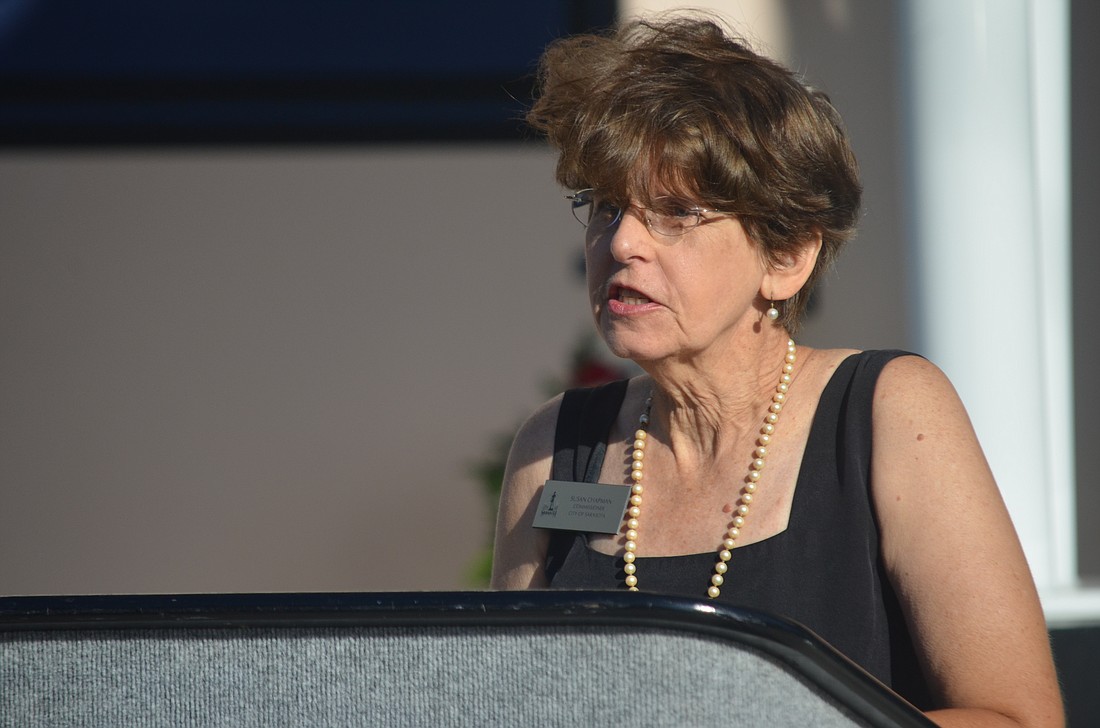- November 5, 2025
-
-
Loading

At around 11:15 a.m. today, Commissioner Susan Chapman got an important telephone call: Judge Brian Iten had made a decision in a lawsuit alleging she violated the Florida Government in the Sunshine law in 2013.
For Chapman, the call was good news.
Iten ruled that Chapman’s attendance at a community meeting regarding homelessness did not constitute a Sunshine law violation, dismissing a claim brought by the group Citizens for Sunshine.
Citizens for Sunshine, represented by attorney Andrea Mogensen and assisted by legal consultant Michael Barfield, argued that Chapman violated state law by attending an Oct. 10, 2013 meeting of downtown merchants on the topic of homelessness. Commissioner Suzanne Atwell attended the same meeting, held at Tsunami Sushi & Hibachi Grill, and settled her portion of the suit quickly after it was filed in 2013.
Based on testimony at the May trial, Iten concluded that Chapman and Atwell did not discuss the issue of homelessness with one another at the meeting. Iten describes Chapman’s attendance at the meeting as “passive,” and rules the gathering did not constitute a meeting under the definition provided in the Florida Constitution.
“To find otherwise would lead to an absurd result, which is what a court is compelled to avoid when applying the law,” Iten wrote.
Iten’s ruling goes on to suggest that, if other public officials find themselves in a similar situation as Chapman, he or she should leave the meeting to leave no room for questions regarding potential violations.
“This court’s ruling in this case should not be deemed an endorsement of Commissioner Chapman’s decision to attend the October 10, 2013 gathering at Tsunami with full knowledge that another commissioner would be in attendance,” Iten wrote. “Those entrusted to hold public office should always endeavor to avoid even the appearance of impropriety.”
Chapman received some criticism for allowing the case to proceed to trial. In 2014, the City Commission voted to suspend the city’s payment of her legal fees in her case. A new board reversed that decision in 2015.
Following the ruling, Chapman’s belief that a verdict was worth pursuing hadn’t wavered.
“The reason I didn’t settle was because I thought it was an important issue for representative government, and it would impact elected official behavior statewide,” Chapman said.
Despite the controversy, there was also a contingent of officials and residents who offered support for Chapman during the case. In an email, City Manager Tom Barwin called the ruling “a victory for the First Amendment rights of residents and business owners to gather and petition their elected officials.”
“There are a lot of people who were very supportive of me throughout this entire process,” Chapman said. “I’m grateful for that.”
Barfield said Citizens for Sunshine plans to appeal the ruling. He, too, was unwavering in his belief that Chapman’s actions constituted a Sunshine law violation. He believes the presence of two commissioners at a private meeting regarding an issue reasonably foreseeable to come before the City Commission is the type of behavior the law is designed to prohibit.
“We don’t believe the court’s factual findings, which are entirely favorable to our client, could be squared with the ultimate legal conclusion,” Barfield said.
Attorney Thomas Shults, who represented Chapman in the suit, said the decision was a firm rebuke of Citizens for Sunshine’s interpretation of the state law — even considering Iten’s admonition at the end of his ruling.
“It’s a good day for representative democracy,” Shults said. “The judgment confirms the Sunshine law was not intended to be a millstone around the necks of public representatives.”
Based on Iten’s judgment, Shults wasn’t troubled by Barfield’s intent to appeal.
“It is a very well reasoned final judgment,” Shults said. “We’re confident it will be affirmed if an appeal is filed.”